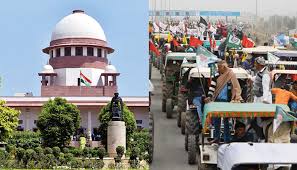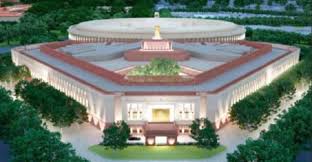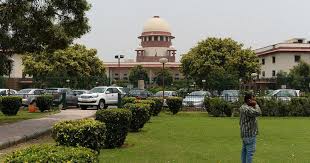Feature
Expressing honest opinions in NJAC would have pitfalls, says SC

New Delhi: The Supreme Court on Thursday said that the rejection of an aspirant for appointment as a judge on the grounds of doubtful credentials could be disastrous with the NJAC coming in the ambit of the defamation law.
The court expressed its misgiving saying that it would be difficult to give an “honest opinion” as NJAC, being a public body and covered under the Right to Information law, its proceedings would go public.
“If somebody is of doubtful credentials he can apply (for appointment as a judge) but you can’t write it. Otherwise you will be hauled up,” said the constitution bench of Justices Jagdish Singh Khehar, Justice J. Chelameswar, Justice Madan B. Lokur, Justice Kurian Joseph and Justice Adarsh Kumar Goel.
The court expressed its misgivings in the course of arguments by Attorney General Mukul Rohatgi, who focusing on the transparency in the appointment process of judges through NJAC, said that the commission was a public authority covered under the Right to Information Act, 2005.
The court said that it would have a disastrous consequences for a person both ways – if not appointed as a judge or even if appointed, as the stigma would haunt him.
It noted that if a recommendation or application of a person is rejected on the grounds of person having “shady character” and it travels to public through RTI, then it would become a matter of defamation.
It would create a situation where you can’t give an honest opinion, the bench observed.
In an attempt to address the misgivings, Rohatgi said let such a person not apply for the judge’s job or there would be checks on the person writing the (NJAC) report so that he uses a temperate language.
However, his suggestion to put the NJAC under RTI Act’s section 8 that provides for exemption from disclosure of information did not find favour with the court. “That you can’t do because your object is transparency,” said as Justice Khehar.
Finding himself in a Catch-22 situation, the attorney general said: “Someone has to suffer for a larger good. There will be protection for public institutions.”
Defending the provision for the presence of two eminent persons on the NJAC including one from women, weaker sections, SC/ST and minorities, he advocated greater representation of women on the benches of higher judiciary keeping in view their increasing presence in the bar.
As one judge on the bench suggested “why not have some number for women representation in the higher judiciary”, Rohatgi, calling for more “sensitisation” over the issue, said: “It will come when it comes to parliament”, in a reference to a long-pending bill on giving 33 percent reservation to women in legislatures.
Trying to scotch apprehension that the two eminent persons, without any rooting in judiciary, would in no way contribute to the appointment of good judges, Rohatgi said that they represented the will and confidence of the people and would also act as a “check and balance” on other members.
Giving the example of the constituent assembly whose members hailed from diverse sections of society, he said: “It is not that a person who have nothing to do with the law can’t contribute to the drafting of law.”
To the court’s query, he reiterated that that the two eminent people need not be jurists.
But the court remained unconvinced with the bench saying: “Eminent person will judge that he is a good lawyer but he will not make a good judge but another person, not so good a lawyer, would be an excellent judge.”
Entertainment
Meghalaya Reserves Legalized Gambling and Sports Betting for Tourists

The State Scores Extra High on Gaming-Friendly Industry Index
Meghalaya scored 92.85 out of 100 possible points in a Gaming Industry Index and proved to be India’s most gaming-friendly state following its recent profound legislation changes over the field allowing land-based and online gaming, including games of chance, under a licensing regime.
The index by the UK India Business Council (UKIBC) uses a scale of 0 to 100 to measure the level of legalisation on gambling and betting achieved by a state based on the scores over a set of seven different games – lottery, horse racing, betting on sports, poker, rummy, casino and fantasy sports
Starting from February last year, Meghalaya became the third state in India’s northeast to legalise gambling and betting after Sikkim and Nagaland. After consultations with the UKIBC, the state proceeded with the adoption of the Meghalaya Regulation of Gaming Act, 2021 and the nullification of the Meghalaya Prevention of Gambling Act, 1970. Subsequently in December, the Meghalaya Regulation of Gaming Rules, 2021 were notified and came into force.
All for the Tourists
The move to legalise and license various forms of offline and online betting and gambling in Meghalaya is aimed at boosting tourism and creating jobs, and altogether raising taxation revenues for the northeastern state. At the same time, the opportunities to bet and gamble legally will be reserved only for tourists and visitors.
“We came out with a Gaming Act and subsequently framed the Regulation of Gaming Rules, 2021. The government will accordingly issue licenses to operate games of skill and chance, both online and offline,” said James P. K. Sangma, Meghalaya State Law and Taxation Minister speaking in the capital city of Shillong. “But the legalized gambling and gaming will only be for tourists and not residents of Meghalaya,” he continued.
To be allowed to play, tourists and people visiting the state for work or business purposes will have to prove their non-resident status by presenting appropriate documents, in a process similar to a bank KYC (Know Your Customer) procedure.
Meghalaya Reaches Out to a Vast Market
With 140 millions of people in India estimated to bet regularly on sports, and a total of 370 million desi bettors around prominent sporting events, as per data from one of the latest reports by Esse N Videri, Meghalaya is set to reach out and take a piece of a vast market.
Estimates on the financial value of India’s sports betting market, combined across all types of offline channels and online sports and cricket predictions and betting platforms, speak about amounts between $130 and $150 billion (roughly between ₹9.7 and ₹11.5 lakh crore).
Andhra Pradesh, Telangana and Delhi are shown to deliver the highest number of bettors and Meghalaya can count on substantial tourists flow from their betting circles. The sports betting communities of Karnataka, Maharashtra, Uttar Pradesh and Haryana are also not to be underestimated.
Among the sports, cricket is most popular, registering 68 percent of the total bet count analyzed by Esse N Videri. Football takes second position with 11 percent of the bets, followed by betting on FIFA at 7 percent and on eCricket at 5 percent. The last position in the Top 5 of popular sports for betting in India is taken by tennis with 3 percent of the bet count.
Local Citizens will Still have Their Teer Betting
Meghalaya residents will still be permitted to participate in teer betting over arrow-shooting results. Teer is a traditional method of gambling, somewhat similar to a lottery draw, and held under the rules of the Meghalaya Regulation of the Game of Arrow Shooting and the Sale of Teer Tickets Act, 2018.
Teer includes bettors wagering on the number of arrows that reach the target which is placed about 50 meters away from a team of 20 archers positioned in a semicircle.
The archers shoot volleys of arrows at the target for ten minutes, and players place their bets choosing a number between 0 and 99 trying to guess the last two digits of the number of arrows that successfully pierce the target.
If, for example, the number of hits is 256, anyone who has bet on 56 wins an amount eight times bigger than their wager.





















